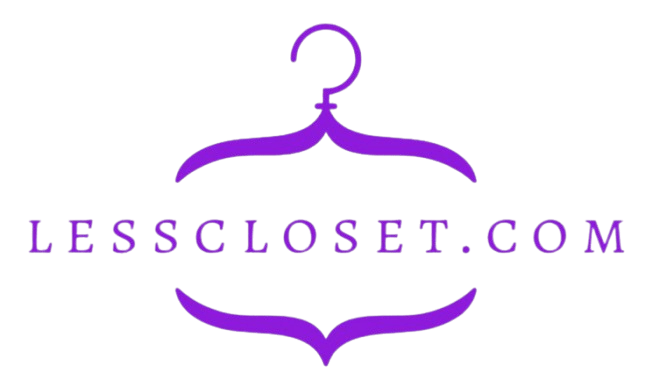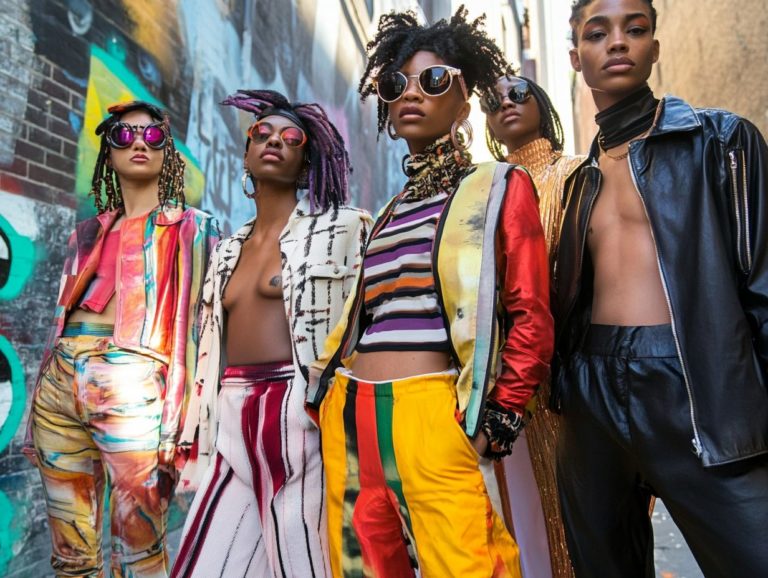How to Explore Sustainable Fashion Further?
Sustainable fashion transcends mere trendiness; it embodies a movement that redefines your relationship with clothing and its impact on the planet.
This exploration delves into the essence of sustainable fashion, illuminating its crucial role in tackling both environmental and social challenges. You ll discover practical tips for mindful shopping and gain insights into how to support ethical brands, all while equipping yourself with actionable steps you can implement.
We will confront the challenges the industry faces and look at innovative solutions shaping its future. Embark on this journey toward a more sustainable wardrobe and redefine your fashion choices today!
Contents
- Key Takeaways:
- The Concept of Sustainable Fashion
- The Importance of Sustainable Fashion
- Ways to Incorporate Sustainable Fashion
- Challenges and Solutions in Sustainable Fashion
- The Future of Sustainable Fashion
- Frequently Asked Questions
- How can I start incorporating sustainable fashion into my wardrobe?
- Are there online resources for exploring sustainable fashion?
- How can I support sustainable fashion without breaking the bank?
- What key values should I consider when exploring sustainable fashion?
Key Takeaways:

- Understand why sustainable fashion matters and embrace it to address environmental and social issues.
- Take practical steps to incorporate sustainable practices in your fashion choices, such as shopping consciously and supporting sustainable brands.
- Overcome challenges in sustainable fashion through collective efforts in promoting and advancing sustainable practices for a better future.
The Concept of Sustainable Fashion
Sustainable fashion represents a transformative approach to how you perceive and engage with the fashion industry, advocating for an ethical wardrobe that prioritizes ecological preservation and the welfare of garment workers.
It aims to counteract the harmful effects of fast fashion by promoting eco-friendly materials and responsible consumption practices that benefit both the planet and its inhabitants.
As you become more aware of your purchasing habits, embracing sustainability is important in driving the circular economy forward in clothing production and consumption. This means reusing materials to reduce waste. Therefore, adopting sustainable practices is not just beneficial; it s important for a healthier future.
Defining Sustainable Fashion
Defining sustainable fashion means grasping the seamless blend of eco-friendly materials and ethical practices throughout the design, production, and consumption of clothing.
At its essence, this approach highlights the importance of choosing materials that minimize environmental impact think organic cotton, recycled fibers, and cutting-edge fabrics sourced from nature. By making these mindful choices, you can help brands significantly reduce pollution and waste.
Sustainable fashion encourages you to make ethical wardrobe decisions, urging you to reflect on the values of the companies you support and the working conditions of those who create your garments.
Embracing this mindset cultivates a culture of conscious consumerism, inviting you to invest in quality pieces instead of succumbing to the allure of fast fashion. This not only promotes longevity in your wardrobe but also helps decrease the overall footprint of the fashion industry.
The Importance of Sustainable Fashion
The significance of sustainable fashion cannot be overstated. It tackles the pressing environmental challenges posed by the fashion industry, such as excessive carbon emissions and waste, while also advocating for the rights of garment workers who often remain in the shadows of the fast fashion narrative.
By redirecting your attention to sustainable practices, you not only help alleviate the adverse effects on the planet but also champion fair labor conditions and responsible consumption that uplift society as a whole.
Embracing this vital shift towards sustainability is essential for cultivating a more equitable and environmentally conscious industry.
Start your journey towards a sustainable wardrobe today!
Environmental and Social Impact
The environmental and social impact of the fashion industry is profound. It brings significant repercussions for both our planet and the communities within it, particularly garment workers.
This complex issue involves alarming levels of pollution from textile manufacturing processes. These processes release hazardous chemicals and dyes into waterways, contaminating ecosystems.
The extensive use of natural resources like water for cotton cultivation and fossil fuels for synthetic fibers exacerbates resource depletion. It also contributes to climate change.
Equally concerning is the human toll. Garment workers often endure poor working conditions, low wages, and limited rights. To tackle these challenges, sustainable fashion solutions are emerging.
These solutions focus on eco-friendly materials, ethical labor practices, and closed-loop systems that reduce waste. They promote fair trade, presenting a more responsible path forward for both the environment and those who create your clothing.
Ways to Incorporate Sustainable Fashion
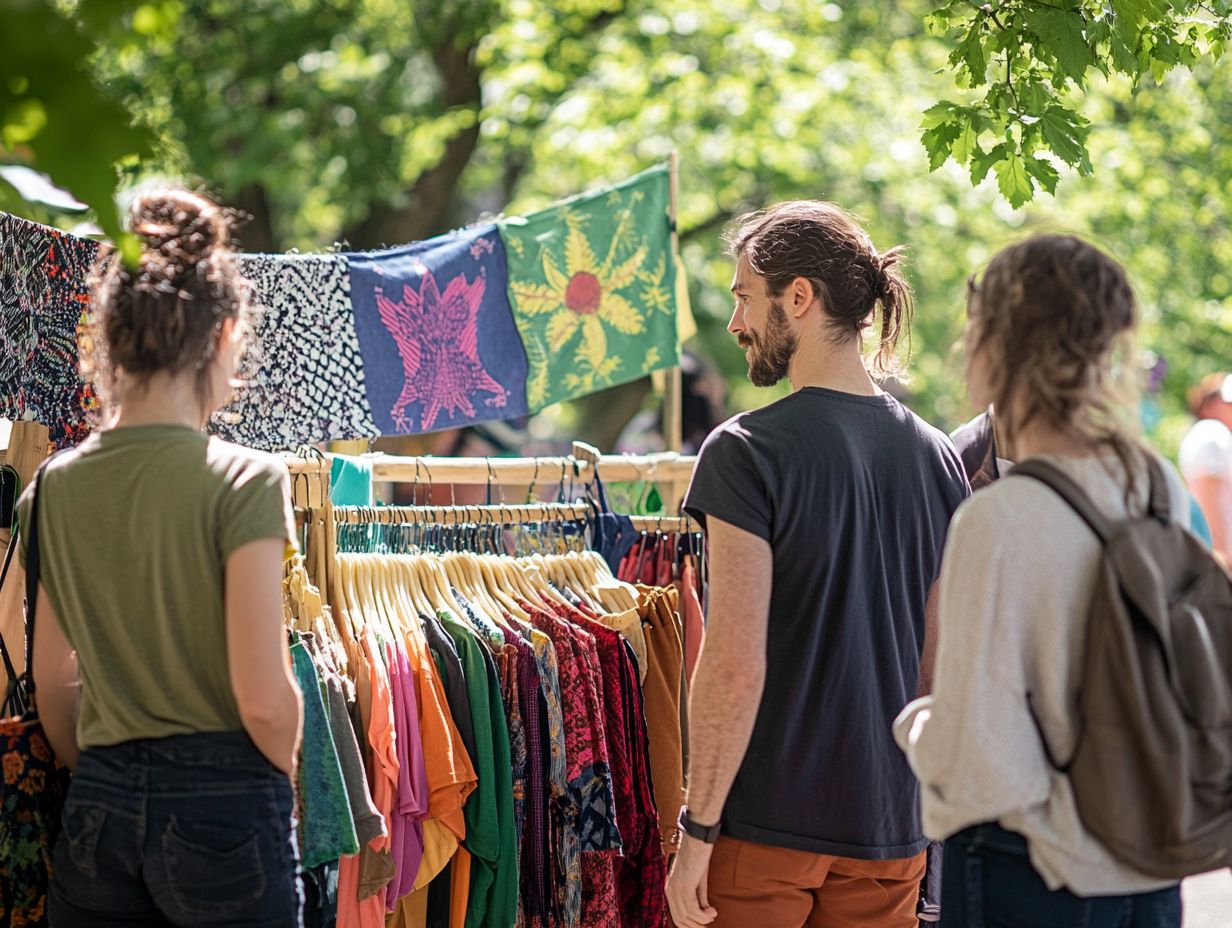
Incorporating sustainable fashion into your life can be accomplished through a range of actionable strategies. These range from adopting tips for sustainable shopping to actively supporting brands that embrace recycling and reusing materials.
By making thoughtful purchasing decisions, you can engage in practices such as clothing recycling and donation. These actions contribute to a more responsible fashion ecosystem.
This approach boosts the demand for ethical choices and creates a buzz for conscious fashion! It nurtures a culture of conscious consumption that benefits both you and the manufacturers.
Tips for Sustainable Shopping
Embracing sustainable shopping means adopting a conscious consumer mindset, where quality takes precedence over quantity.
One effective way to evaluate your clothing choices is through the 30 wears test. This encourages you to consider the longevity of each item.
This mindful approach not only champions ethical fashion but also plays a significant role in reducing waste. It creates a positive ripple effect on the environment.
Consider elevating your wardrobe by looking into vintage pieces, which often possess unique charm and come with their own environmental benefits.
It s essential to scrutinize material quality. Leaning towards natural fibers like organic cotton or linen will ensure that your garments withstand the test of time.
By committing to a minimalistic approach, you can curate a versatile collection that maximizes outfit combinations. This ultimately paves the way for a more sustainable lifestyle.
Supporting Sustainable Brands
Supporting sustainable brands is essential for cultivating an ethical wardrobe. These companies genuinely prioritize eco-friendly practices and transparency in their production processes.
By embracing elements like ethically sourced materials and fair labor standards, these brands not only positively impact the environment but also empower communities in meaningful ways.
To find these gems, turn to social media platforms for valuable insights and connections. Engaging with eco-conscious influencers or diving into sustainability hashtags can lead you to companies like Patagonia and Reformation.
Reading reviews and researching their supply chains on social media will deepen your understanding of their strategies and values. This allows you to make informed choices that truly align with your ethical standards.
Challenges and Solutions in Sustainable Fashion
The path to sustainable fashion presents numerous challenges. You must confront them to make a meaningful impact, especially given the overwhelming presence of fast fashion in the industry.
These obstacles encompass consumer apathy, limited access to sustainable choices, and the pressing need for innovative solutions. Solutions like clothing recycling and donation programs can reduce waste and foster responsible consumption.
Addressing these barriers is crucial for paving the way toward a sustainable future in fashion. We must act now to create a sustainable future in fashion!
Addressing Barriers to Sustainable Fashion
Addressing the barriers to sustainable fashion demands many different ways. You need to raise awareness about the consequences of fast fashion and promote viable alternatives, like clothing donation.
It s crucial to educate yourself about the environmental and ethical implications of your purchasing choices. Many people don t realize just how significant their buying habits are on the planet and the labor involved in garment production.
Accessibility to sustainable options is another vital concern. You might find these products pricier or harder to come by.
To bridge this gap, brands and organizations could implement strategies such as:
- Community workshops: These events can teach you about sustainable practices.
- Online resources: Accessible guides and tools to help you make informed choices.
- Partnerships with local thrift stores: Collaborations that promote second-hand shopping.
These initiatives could make sustainable fashion not only more accessible but also genuinely appealing to you.
Promoting Sustainable Practices
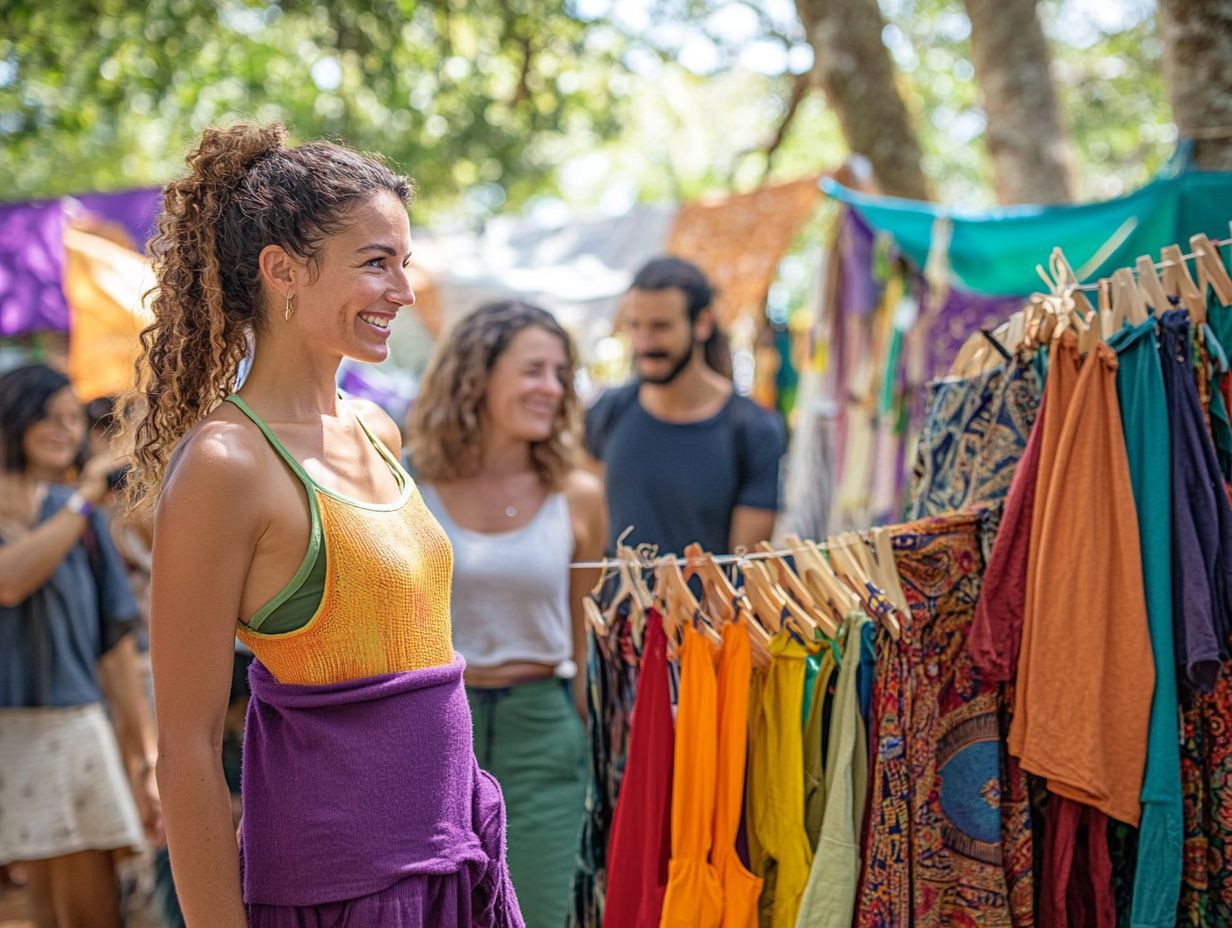
Promoting sustainable practices within the fashion industry is crucial for fostering a culture of conscious consumerism that emphasizes eco-friendly materials and ethical production.
To achieve this, you can employ various strategies, such as launching educational initiatives designed to raise awareness about sustainable fashion choices among consumers.
Community engagement is important. By bringing local groups together, you can facilitate the sharing of knowledge and participation in workshops focused on upcycling and responsible sourcing.
Collaborating with brands that are committed to sustainability can further amplify these efforts. These partnerships can lead to new ideas and a broader reach. By integrating these elements, you can help turn the movement toward a more sustainable fashion choices daily into a tangible reality.
The Future of Sustainable Fashion
The future of sustainable fashion is exciting and full of possibilities, filled with innovations and advancements that are set to redefine your relationship with your wardrobe and the fashion industry at large.
As awareness surrounding the environmental and social ramifications of your choices increases, a shift toward a more equitable and eco-conscious approach is on the horizon. This approach is rooted in a system where we reuse materials to reduce waste.
This transformation will enable you to curate an ethical wardrobe while inspiring brands to embrace sustainable practices that contribute positively to our planet.
Innovations and Progress in the Industry
Innovations in sustainable fashion are reshaping the industry, placing a spotlight on eco-friendly materials and practices that align seamlessly with circular economy principles.
These groundbreaking approaches encompass an impressive array of advancements. This includes biofabricated textiles, which are made from agricultural byproducts, and recycled fibers spun from post-consumer waste. You ll find that brands are increasingly adopting processes like waterless dyeing, which uses no water, and 3D knitting technology, which minimizes waste.
By prioritizing these sustainable practices, the fashion sector can significantly reduce its carbon footprint while appealing to a growing consumer base that values ethical production. For those interested in supporting local initiatives, exploring sustainable fashion in your local area can also contribute to this positive change. As these innovations become mainstream, they possess the remarkable potential to transform the entire supply chain, nurturing a more responsible and resilient industry.
Frequently Asked Questions
What exactly is sustainable fashion?
Sustainable fashion refers to the production, design, and consumption of clothing and accessories in a way that has minimal negative impact on the environment and society. This includes using eco-friendly materials, ethical production processes, and promoting fair labor practices.
Why is it important to explore sustainable fashion further?
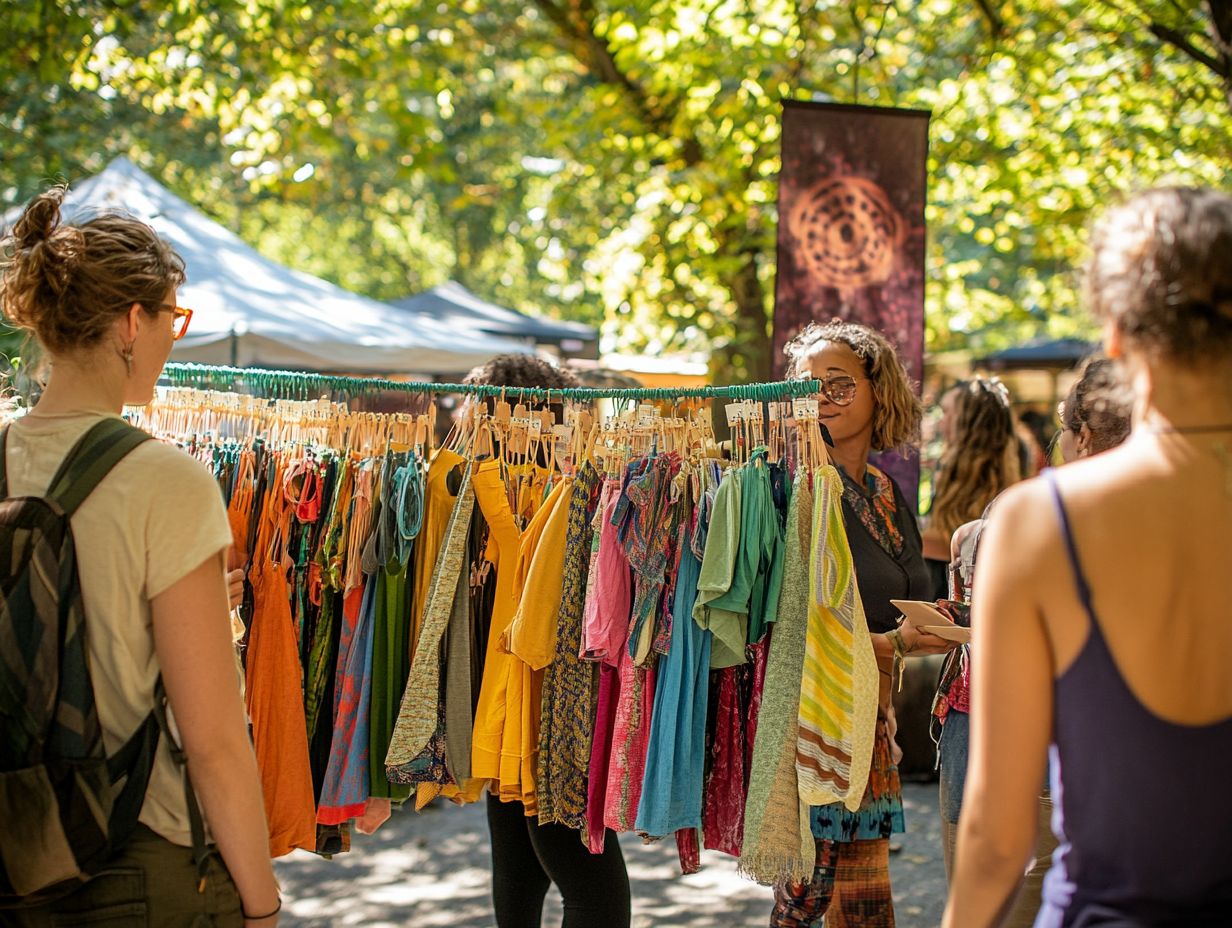
Exploring sustainable fashion further allows us to understand the impact of our clothing choices and make more conscious decisions. It also promotes a more environmentally and socially responsible fashion industry.
How can I start incorporating sustainable fashion into my wardrobe?
Start by educating yourself about sustainable fashion. Learn about environmentally friendly materials, fair trade practices, and brands that care for the planet.
Are there online resources for exploring sustainable fashion?
Yes! Many blogs and websites offer valuable insights. Check out Eco Warrior Princess, Good On You, and Conscious Life & Style for tips and recommendations.
How can I support sustainable fashion without breaking the bank?
Shop at thrift stores or swap clothes with friends! Investing in quality, timeless pieces reduces the need for frequent purchases.
What key values should I consider when exploring sustainable fashion?
Keep transparency, responsibility, and longevity in mind. Know where your clothes come from and choose brands that prioritize ethical practices.
